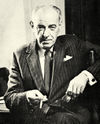The Unquiet Sleep: Difference between revisions
imported>Hayford Peirce (→Reception and/or Appraisal: put in the NYT review) |
imported>Hayford Peirce (→Reception and/or Appraisal: put in the ref. link I hope) |
||
| Line 15: | Line 15: | ||
<blockquote> xxxx. </blockquote> | <blockquote> xxxx. </blockquote> | ||
<blockquote>''The New York Times'': With all the recent controversy over the side-effects of such drugs as Percodan, Enovid and thalidomide, the theme of William Haggard's THE UNQUIET SLEEP is unusually timely. Evidence indicates that a new tranquillizer, Mecron, is probably addictive. One of Her Majesty's Secretaries is connected with the company manufacturing Mecron -- which makes for political intrigues and scandal. A Cypriot black-market gang wants to exploit the new addicts and only Col. Charles Russell of the Security Executive can cope with all the resultant complications. Haggard may prove a little intricate for the hasty reader, but will richly reward the discrimating.<ref>Anthony Boucher, ''Criminals at Large'', ''The New York Times'', September 30, 1962 at [ | <blockquote>''The New York Times'': With all the recent controversy over the side-effects of such drugs as Percodan, Enovid and thalidomide, the theme of William Haggard's THE UNQUIET SLEEP is unusually timely. Evidence indicates that a new tranquillizer, Mecron, is probably addictive. One of Her Majesty's Secretaries is connected with the company manufacturing Mecron -- which makes for political intrigues and scandal. A Cypriot black-market gang wants to exploit the new addicts and only Col. Charles Russell of the Security Executive can cope with all the resultant complications. Haggard may prove a little intricate for the hasty reader, but will richly reward the discrimating.<ref>Anthony Boucher, ''Criminals at Large'', ''The New York Times'', September 30, 1962 at [https://timesmachine.nytimes.com/timesmachine/1962/09/30/121655953.html?pageNumber=200]</ref></blockquote> | ||
https://timesmachine.nytimes.com/timesmachine/1962/09/30/121655953.html?pageNumber=200 | |||
<blockquote>Anthony Cronin, ''Times Literary Supplement'', date unknown: xxxxx </blockquote> | <blockquote>Anthony Cronin, ''Times Literary Supplement'', date unknown: xxxxx </blockquote> | ||
Revision as of 15:43, 4 October 2020
Authors [about]:
join in to develop this article! |
The Unquiet Sleep is a 1962 suspense novel by the British author William Haggard published in England by Cassell and in the United States by Ives Washburn. It was Haggard's fourth of 21 books involving his protagonist Colonel Charles Russell, the head of the unobtrusive but lethal Security Executive, a government counter-intelligence agency, where he moves easily and gracefully along C.P. Snow's Corridors of Power. Like all of Haggard's books it has standard elements of suspense thrillers
Plot
Protagonist is perhaps too strong a word to describe Colonel Russell. As Haggard himself wrote about his fiction:
My novels are chiefly novels of suspense with a background of international politics. A Colonel Charles Russell of the Security Executive, a not entirely imaginary British counter-espionage organization, while not a protagonist in the technical sense, holds the story line together in the background by his operations, while the characters in the foreground carry the action."[1]
Reception and/or Appraisal
Reviews were mixed:
xxxx.
The New York Times: With all the recent controversy over the side-effects of such drugs as Percodan, Enovid and thalidomide, the theme of William Haggard's THE UNQUIET SLEEP is unusually timely. Evidence indicates that a new tranquillizer, Mecron, is probably addictive. One of Her Majesty's Secretaries is connected with the company manufacturing Mecron -- which makes for political intrigues and scandal. A Cypriot black-market gang wants to exploit the new addicts and only Col. Charles Russell of the Security Executive can cope with all the resultant complications. Haggard may prove a little intricate for the hasty reader, but will richly reward the discrimating.[2]
https://timesmachine.nytimes.com/timesmachine/1962/09/30/121655953.html?pageNumber=200
Anthony Cronin, Times Literary Supplement, date unknown: xxxxx
Kirkus Reviews: xxxxx [3]
